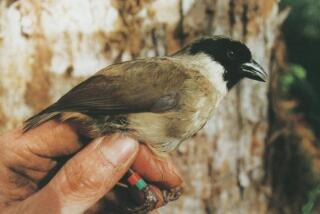Lake Dwellers Intend to Defend Mute Swans
- Share via
MUKWONAGO, Wis. — The swans that inhabit Grace Graham’s poetry are white as fresh linen. They glide across Phantom Lake like elegant apparitions, paddling webbed feet into stanzas she writes before dawn, when it seems that the birds are the only beings awake:
Along the misty isle, seen by no mortal save me, they came
White swans alongside as I ran into the silence, into the fog, into enchantment.
But Graham’s feathered muses have one fatal flaw. They’re mute swans, nonnative birds that the state plans to kill to make room for trumpeter swans, a once-exterminated native species that with human help, has returned.
For a writer of verse, it’s poetic injustice.
Graham, 69, is more gardener than rabble-rouser. By 7 a.m. each day she’s shoulder-deep in the lake’s clear water, feeding slices of white bread to a feathered family of five.
But in the face of a mute-swan massacre, she stands defiant with others along the lake, poised to fight off Wisconsin’s Department of Natural Resources like a bird chasing predators from its nest.
“I know they’ve chained themselves to the redwoods in California,” said Graham, pondering passive aggression. “It’s pretty hard to chain yourself to a swan.”
The mute swans have lived here for decades and, like a more familiar group of two-legged settlers, first came to America from Europe. Though they’ve thrived in this country for more than 100 years, the birds are still foreigners.
Trumpeter swans, however, are as native as the Potawatomi Indians that once lived on the shores of Phantom Lake. Hunters had wiped out the Midwest’s trumpeter population by 1900, but over the past two decades they have been successfully reintroduced.
Though they share white feathers and an air of grace, the two species don’t get along. Mute swans tend to be more aggressive -- the roughnecks of the swan family -- and chase the trumpeters away.
Life on Phantom Lake was changed in May when a state resources official spotted a pair of trumpeters nesting in the tall shoreline weeds and cattails. The trumpeters wound up leaving, but the die was cast. Mukwonagons were told the 40 or so mute swans they’d come to know would be shot in hopes the trumpeters would return.
This didn’t set well with those who’ve filled their homes with ceramic swan tchotchkes and photos of children kneeling to feed long-necked birds named Rudy and Rosie.
“Just because these birds are nonnative, why would we have to kill them?” asked Patricia Kujawa, a resident who along with Graham has been leading the mute swan defense. “I asked, ‘When do they get reciprocity?’ And the DNR said, ‘Never.’ ”
Though the mute swans have roamed Phantom Lake for years, the concept of squatters’ rights holds little sway in ecological circles. The Department of Natural Resource’s philosophy is simple: If the native trumpeters come, the nonnative mutes must go.
Pat Manthey is an resource’s department avian ecologist. At a public meeting last month in Mukwonago, she and others from her agency were heckled -- and eventually run off -- by residents who don’t fancy having their swans shot.
“It was probably the worst public meeting I’ve ever been to,” she said, still sounding a bit shaken. “But when you’re dealing with science versus emotionality, science is going to win out.”
Similar dramas have played out across the country. Folks from natural resource agencies and ornithological groups seek to get rid of the mute swans, which they consider winged varmints. In most cases, as Manthey predicted, science is the victor.
That sends chills down the spines of Mukwonagons like Nancy Ward, a 15-year lakeside dweller who, from her kitchen, looks out at the swans each morning over her toast and orange juice. One pair -- which she calls Mr. and Mrs. Swanie -- routinely float to her shore for bread.
“We’re just asking the DNR to please leave the swans alone,” Ward said. “They say they’re not native to this area. Well, we’re not native either. Maybe they should just get rid of us too.”
Many a Wisconsinite would advise Ward to be careful what she asks for. In this hunting- and fishing-crazed state, the department is seen by some portions of the populace as a diabolical entity, or at least diabolically inept.
Some have even raised the theory that the department planted trumpeter swans on Phantom Lake to create an excuse to shoot the mute swans.
Manthey says her department has no ill intent beyond maintaining the natural order of Wisconsin’s wildlife.
“It’s a matter of competition between an exotic, invasive species and our native waterfowl,” she said. “What we’re trying to do is restore our native flora and fauna.”
After the boisterous meeting last month, resources officials said they would hold off killing the mute swans on Phantom Lake until another meeting could be held in January. But, Manthey said, “The end goal is to remove all free-flying mute swans from the state.”
Which leaves parents around the lake wondering what they’ll tell their kids if the ever-present swans disappear behind the echoes of shotgun blasts.
“I don’t belong to any PETA, bird society or Audubon Society,” said Kujawa, riding Graham’s pontoon boat past clusters of swans. “But we live here and we’ve seen how they are. They aren’t aggressive. I have pictures of them swimming with my children.”
Graham, the poet, thinks back on a verse she wrote some time ago:
Swans in parade pass in review, announcing to all that spring’s been renewed.
“I try not to think about the fact that they might very well shoot them come springtime,” she said. “I’ve had trouble sleeping since June.”
More to Read
Sign up for Essential California
The most important California stories and recommendations in your inbox every morning.
You may occasionally receive promotional content from the Los Angeles Times.












